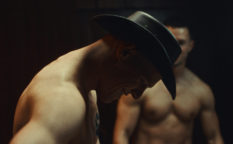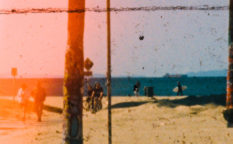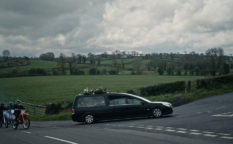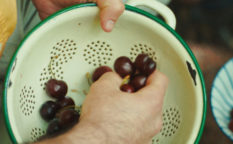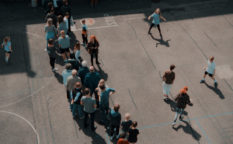Review: Merry Christmas, Yiwu (2020)
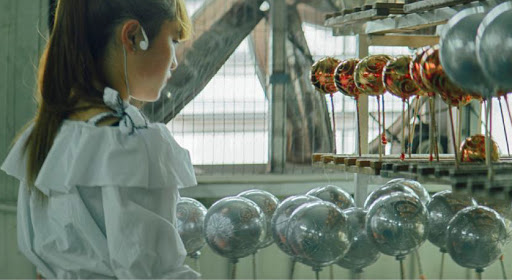
Christmas spirit might live all over the world, but in this globalized, capitalist world it is clearly produced in Yiwu, a 1.2 million people city in Eastern China, south-west of Shanghai. The Christmas goods industry is a multi-billion-dollar business, and more than two thirds of it comes from Yiwu and its several hundred factories. The town, its inhabitants, its factories, their workers and management is the principal topic of Mladen Kovačević’s newest observational documentary Merry Christmas, Yiwu that premiered earlier this year at Rotterdam and won the Heart of Sarajevo at the documentary competition of the recently closed SFF.
Before the industrial boom that started in the 80s, Yiwu was just an unremarkable poor town and the industry of cheap plastics disguised in Christmas motives made it into a considerably big and affluent city that draws a lot of migrant workers from nearby villages and other parts of China. Funny thing, though: majority of the workers and the management do not care much about Christmas itself and Christianity as a concept. Simply, it is not a part of their culture and some of them do not get what all the fuss is about. For them it is a day-in-day-out work that lasts throughout the year.
The shipments of goods should depart to their Western destinations by mid-autumn, so summer is the highpoint of the production season, making the winter an ideal season for a break. The quality control and the safety standards are not a priority, and apparently nobody gives much thought about waste management. The working conditions are pretty basic and the same goes for living ones, usually in the cramped dormitories, but the wages are good enough to provide the workers with smartphones that allow them to communicate with their families they left back home and with some entertainment varying from the national holiday festivities to the drunken karaoke nights where nostalgia is the most dominant feeling.
The workers and the management alike have their own things to worry about. The relationships are hard to maintain with the pace of the work being like it is. Others are planning to expand their business (most of the factories started as small, family-owned workshops), to make a better life for themselves and to develop their side jobs, such as one family’s farm where porcupines are raised for the purpose of their expensive meat.
Kovačević shows all the pieces of the mosaic called life in an observational fashion. He refrains from any kind of comment or assuming the political position. There is not much of the context explanation either, although Kovačević inserts the excerpts from the communication between some of the characters that serves as separators between the chapters. All the dialogue in the film feels like over-heard conversation without even a notion of staging it.
The tempo the filmmaker opts for is slow and steady, simulating the life as it feels like there. When the filmmaker moves out from the factory setting to that of the personal lives of the people, there is even some poetry to be found under the mundane and prosaic content, especially towards the end of the film. Thanks to the perfect editing by Jelena Maksimović and the widescreen cinematography handled by Marko Milovanović that catches the ambient and the atmosphere of the different aspects of the place, Merry Christmas, Yiwu is a film that offers a bit more than a glimpse to the phenomenon of the contemporary world. It is quite a nutritious food for thought.
Runtime: 94’
Countries: Sweden, Serbia, Germany, France, Qatar, Belgium
Language: Mandarin
Directed by: Mladen Kovačević
Written by: Mladen Kovačević
Cinematography by: Marko Milovanović
Editing by: Jelena Maksimović
Music by: Olof Dreijer
Sound design by: Patrik Strömdahl
Colourist: Isabelle Julien
Post production: Ike No Koi
Produced by: Iva Plemić Divjak, Mario Adamson, Ruth Reid
Co-producers: Jasmina Sijerčić, Heino Deckert, Thierry Detaille
Production companies: Sisyfos Film, Filmska produkcija Horopter, Bocalupo Films, Ma.Ja.De. Filmproduktion, NDR/Arte, RTBF Documentaries, Visible Film
Supported by: Film Centre of Serbia (FCS), Swedish Film Institute, Doha Film Institute, Visions Sud Est, La région Île-de-France, Current Time TV, Radio Télévision Suisse (RTS), Radiotelevisione svizzera (RSI), Yle, Republic of Serbia – Ministry of Culture and Media

